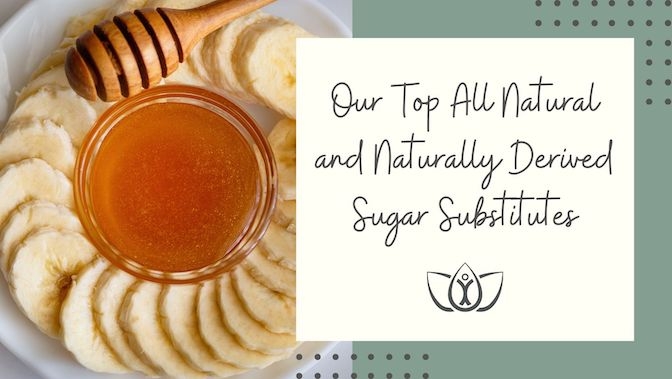For most, there’s no denying that sweet treats are challenging to resist. But when you don’t know what kind of sugar or sugar substitute is used, a sweet tooth dilemma may become more complex.
Sugar substitutes are not new to the market. Since the rise of “diet” sodas and other treats, many people believed the solution to indulging in sweet cravings without the added calories was found. However, as more information emerged, it was discovered that certain substitutes could be detrimental to overall health.
Most sugar substitutes are considered “non-nutritive,” meaning they have no nutritional value. However, the body can still react and be influenced by these substances. Limiting chemical substitutes, such as aspartame, which is zero calories, can be even more imperative since it may be associated with other non-caloric reported negative side effects.
While some all-natural sugar substitutes may still have calories, there are low or zero-calorie options and others with greater nutrient profiles than traditional forms of sugar. Work with your healthcare professional to determine what option may be best for you, especially if you have a sensitivity to sugar or sugar substitutes or a condition that doesn’t allow you to process sugar properly, like diabetes.
We compiled our favorite sugar substitutes for you to consider. Read on to learn more about our top choices.
Natural and Naturally Derived Sugar Substitutes
There is nothing unusual about wanting to satisfy your sweet tooth occasionally, but it’s always important to do so in moderation. Even natural sugar substitutes can become less beneficial when used in excess. This is especially true when treats are chosen over nutrient-dense sweets like fresh fruit. Sugar or substitutes can also be addictive due to their dopamine-inducing effects on the brain. So, bake, snack, and choose desserts responsibly!
All-Natural Sugar Substitutes
1. Bananas
Bananas don’t only add sweetness to dishes and desserts. They are also packed with nutrition. Bananas contain potassium, vitamin B6, vitamin C, manganese, fiber, and magnesium. On the glycemic index (GI), which measures carbohydrates and how a food affects blood sugar, ripe bananas are a low GI food at 51, and under-ripe bananas are as low as 42. Another reason to keep bananas in your kitchen is the peel’s anti-inflammatory and antiseptic properties that can support minor wound healing, including bug bites and sunburns.
2. Honey
On the glycemic index, honey measures 61, making it a medium GI food. A bonus for keeping honey in your pantry is its anti-inflammatory, anti-bacterial, and antioxidant properties, allowing it to manage coughs and support minor wound healing. It also contains iron, zinc, amino acids, vitamins, and minerals. Local honey may also help support seasonal allergies through desensitization to the pollens in the air. Honey must be avoided for people with a bee pollen allergy or children under age one.
Naturally Derived Sugar Substitutes
These sugar substitutes are typically low or zero-calorie and come from natural sources, and we favor them over purely chemical varieties. However, store-bought versions can be highly processed, so depending on your goals and current health conditions, you will need to take this into consideration. In addition, some of the products derived from our choices below can contain sugar alcohols, which can cause or exacerbate digestive issues, as well as other hidden ingredients, so always read the nutrition label and conduct additional research.
1. Stevia
Stevia is an herb that has a naturally sweet taste. We recommend choosing organic and non-GMO stevia products whenever possible. In addition to being derived from a plant, stevia does not affect blood sugar, and it can be used for baking. Studies also have shown that elements in stevia can kill certain cancer cell lines, decrease mitochondrial pathways where cancer can grow, and reduce the risk of pancreatic cancer by 23%.
2. Monk Fruit Sweetener
Monk Fruit is a fruit native to southern China that has been used in Eastern traditions to support digestion and individuals with colds. Monk Fruit is a zero-calorie sweetener, and like stevia, we recommend finding non-GMO and organic options if possible. A bonus for using Monk Fruit sweetener is that it contains antioxidants. Monk Fruit is often blended with erythritol or other sugar alcohols, so be sure to read the ingredients. Sugar alcohol-free versions are not associated with digestive upset, so it’s a good choice for people who experience digestive issues.
Conclusion:
Living naturally-minded doesn’t mean that you need to skip out on sweet foods and beverages. However, moderation is always key. With these sugar substitutes and other healthy alternatives, you can eventually discover which one is your favorite and how to use it best. It’s important to remember that each sugar substitute has different levels of sweetness. Therefore, you may need to experiment with more or less than traditional recipes suggest to attain your desired level of sweetness. Each also has a different number of calories, ingredients, and processing. Research your favorite sugar substitute further to determine how it can be used in food and beverages and whether it can be baked or heated. Make sure to also speak with your healthcare provider for further individualized guidance.
To learn more about nutrition and holistic living, consider enrolling in our Certified Nutritional Consultant program. Call 800-428-0408, option 2, or visit our website at trinityschool.org/program/cnc to discover more about this program and enroll.

